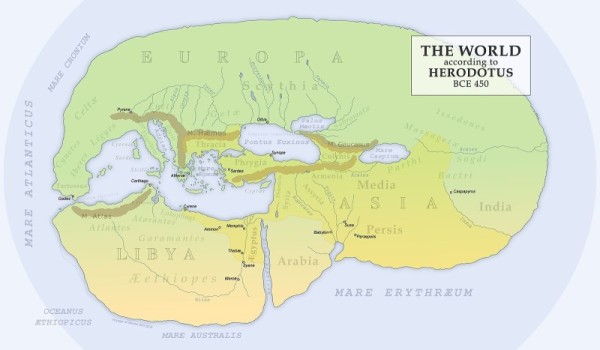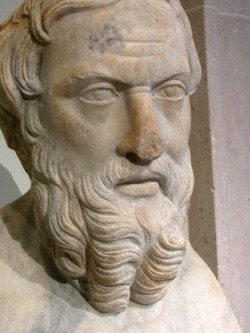But when it was day, those who were left behind perceived that they had been betrayed by Darius, and they held out their hands in submission to the Scythians. . . .”

Translated by George C. Macaulay — our special project presenting the complete Herodotus with URLs for all of those people, places, events, and things which baffles and discourages modern readers.
Previously on Herodotus
135. Thus Gobryas advised; and after this, when night came on, Darius acted on this opinion. Those of his men who were weakened by fatigue and whose loss was of least account, these he left behind in the camp, and the asses also tied up: and for the following reasons he left behind the asses and the weaker men of his army, the asses in order that they might make a noise which should be heard, and the men really because of their weakness, but on a pretence stated openly that he was about to attack the Scythians with the effective part of the army, and that they meanwhile were to be defenders of the camp. Having thus instructed those who were left behind, and having kindled camp-fires, Darius hastened by the quickest way towards the Ister: and the asses, having no longer about them the usual throng, very much more for that reason caused their voice to be heard; so the Scythians, hearing the asses, supposed surely that the Persians were remaining in their former place.
136. But when it was day, those who were left behind perceived that they had been betrayed by Darius, and they held out their hands in submission to the Scythians, telling them what their case was; and the Scythians, when they heard this, joined together as quickly as possible, that is to say the two combined divisions of the Scythians and the single division, and also the Sauromatai, Budinoi, and Gelonians, and began to pursue the Persians, making straight for the Ister: but as the Persian army for the most part consisted of men on foot, and was not acquainted with the roads (the roads not being marked with tracks), while the Scythian army consisted of horsemen and was acquainted with the shortest cuts along the way, they missed one another and the Scythians arrived at the bridge much before the Persians. Then having learnt that the Persians had not yet arrived, they said to the Ionians who were in the ships: Ionians, the days of your number are past, and ye are not acting uprightly in that ye yet remain waiting: but as ye stayed before from fear, so now break up the passage as quickly as ye may, and depart free and unhurt, feeling thankfulness both to the gods and to the Scythians: and him who was formerly your master we will so convince, that he shall never again march with an army upon any nation.
137. Upon this the Ionians took counsel together; and Miltiades the Athenian on the one hand, who was commander and despot of the men of the Chersonese in Hellespont, was of opinion that they should follow the advice of the Scythians and set Ionia free: but Histiaios the Milesian was of the opposite opinion to this; for he said that at the present time it was by means of Darius that each one of them was ruling as despot over a city; and if the power of Darius should be destroyed, neither he himself would be able to bear rule over the Milesians, nor would any other of them be able to bear rule over any other city; for each of the cities would choose to have popular rather than despotic rule. When Histiaios declared his opinion thus, forthwith all turned to this opinion, whereas at the first they were adopting that of Miltiades.
138. Now these were they who gave the vote between the two opinions, and were men of consequence in the eyes of the king, — first the despots of the Hellespontians, Daphnis of Abydos, Hippoclos of Lampsacos, Herophantos of Parion, Metrodoros of Proconnesos, Aristagoras of Kyzicos, and Ariston of Byzantion, these were those from the Hellespont; and from Ionia, Strattis of Chios, Aiakes of Samos, Laodamas of Phocaia, and Histiaios of Miletos, whose opinion had been proposed in opposition to that of Miltiades; and of the Aiolians the only man of consequence there present was Aristagoras of Kyme.

CC BY-SA 2.0 image from Wikipedia.
139. When these adopted the opinion of Histiaios, they resolved to add to it deeds and words as follows, namely to break up that part of the bridge which was on the side towards the Scythians, to break it up, I say, for a distance equal to the range of an arrow, both in order that they might be thought to be doing something, though in fact they were doing nothing, and for fear that the Scythians might make an attempt using force and desiring to cross the Ister by the bridge: and in breaking up that part of the bridge which was towards Scythia they resolved to say that they would do all that which the Scythians desired. This they added to the opinion proposed, and then Histiaios coming forth from among them made answer to the Scythians as follows:
Scythians, ye are come bringing good news, and it is a timely haste that ye make to bring it; and ye on your part give us good guidance, while we on ours render to you suitable service. For, as ye see, we are breaking up the passage, and we shall show all zeal in our desire to be free: and while we are breaking up the bridge, it is fitting that ye should be seeking for those of whom ye speak, and when ye have found them, that ye should take vengeance on them on behalf of us as well as of yourselves in such manner as they deserve.
140. The Scythians then, believing for the second time that the Ionians were speaking the truth, turned back to make search for the Persians, but they missed altogether their line of march through the land. Of this the Scythians themselves were the cause, since they had destroyed the pastures for horses in that region and had choked up with earth the springs of water; for if they had not done this, it would have been possible for them easily, if they desired it, to discover the Persians: but as it was, by those things wherein they thought they had taken their measures best, they failed of success. The Scythians then on their part were passing through those regions of their own land where there was grass for the horses and springs of water, and were seeking for the enemy there, thinking that they too were taking a course in their retreat through such country as this; while the Persians in fact marched keeping carefully to the track which they had made before, and so they found the passage of the river, though with difficulty: and as they arrived by night and found the bridge broken up, they were brought to the extreme of fear, lest the Ionians should have deserted them.
– Herodotus, Book IV
| <—Previous | Master List | Next—> |
Herodotus made his living by being interesting. In a world where most people did not read and could not afford to buy a book even if they could, they would pay to listen to Herodotus recite from his books. They would not pay to be bored. In that world, the names that populate his stories would have some general familiarity to his audience. Their obscurity to us is a barrier that this series seeks to break down.
MORE INFORMATION
MAP LIBRARY
Because of lack of detail in maps as embedded images, we are providing links instead, enabling readers to view them full screen.

Leave a Reply
You must be logged in to post a comment.